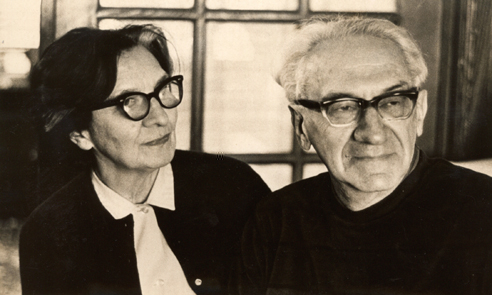Immanuel Velikovsky -
His Life

Immanuel Velikovsky was born in Vitebsk in White Russia in 1895.
He studied medicine, science and other subjects, e.g. philosophy, ancient history and law at the Universities of Montpellier (France), Edinburgh (Great Britain), Moscow (Russia) and Kharkiv (Ukraine) in difficult circumstances caused by the discrimination and persecution of the Jews as well as the political and war-related chaos of the time.
After getting his M.D. in Moscow in 1921 he emigrated to Germany, where he founded the scientific journal Scripta Universitatis in Berlin. In this project he came into contact with Albert Einstein, who was editor of the mathematical-physical section. This project, furthermore, laid the foundation for the Hebrew University of Jerusalem, the presidency of which was offered to Immanuel Velikovsky.
After getting married to his wife Elisheva (s. photo) in 1923 Velikovsky settled in Palestine and started to practice as a physician. At the same time he started to study psychoanalysis with Wilhelm Stekel, the first disciple of Freud, whom he visited several times in Vienna, published several scientific papers about the subject and opened the first psychoanalytical practice in Palestine.
Doing research for a planned book project about Freud’s dream interpretation and about a new view of Freud’s heros Oedipus and Akhnaton, Velikovsky needed access to numerous literary sources. For this reason in 1939 he travelled to New York together with his family. Shortly afterwards World War II began and he had to extend his stay for an indefinite period, finally staying in the US for good due to his unexpected discoveries.
The next 10 years he spent with intensive research about the geological and anthropological facts he had discovered, which in 1949 he presented to the public in his book Worlds in Collision. By its contents, as well as by the scandalous reaction of the representatives of the scientific establishment, this book initiated such a far-reaching and revolutionary development in many areas of science and society that until today its actuality and importance have even increased.
Velikovsky himself, however, even after the publication of 4 more books, was confronted with a heavy up and down of overwhelming acceptance and devastating – unfortunately mostly very unserious – rejection, which resulted in a heavy psychological burden for him.
After moving to Princeton in the fifties he had a close and friendly relationship with Albert Einstein, discussing his theories with him. After Einstein’s death Velikovsky’s Worlds in Collision was found open on his desk.
Inspite of more and more recent research in geology and planetology supporting his theories, Velikovsky remained the victim of a discrediting campaign until his death, which is neither in proportion with his exact scientific methodology nor with the contents and importance of his works.
He died in Princeton in 1979.